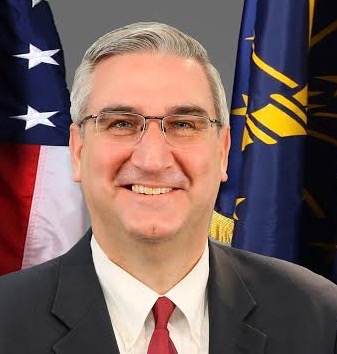INDIANAPOLIS — Governor Eric J. Holcomb today announced several new appointments and reappointments to various state boards and commissions.
 Fire Prevention & Building Safety Commission
The governor made one new appointment to the commission, who will serve until Aug. 31, 2022:
- James Greeson (Indianapolis), former Indiana State Fire Marshal
 Governor’s Commission on Minority & Women’s Business Enterprises
The governor made two reappointments to the commission, who will serve until Sept. 30, 2023:
- Remo Mezzetta (Indianapolis), director of business development for Mezzetta, Inc.
- Frances Vega-Steele (Portage), retired associate vice-chancellor of student affairs with Ivy Tech Community College
The governor also made three new appointments to the commission, who will serve until Sept. 30, 2023:
- Ellen Dunnigan (Carmel), founder and president of Accent on Business, LLC
- Rebecca Kubacki (Syracuse), former Indiana state representative
- Litany Pyle (Covington), attorney with Elizabeth A. Justice, Attorney at Law
 Healthy Hoosiers Foundation Board of Directors
The governor made four reappointments to the board, who will serve until Oct. 31, 2022:
- Daniel Evans, Jr. (Indianapolis), former CEO of Indiana University Health
- Dr. Paul Halverson (Indianapolis), founding dean and professor at the Richard M. Fairbanks School of Public Health
- Dr. Maria Del Rio Hoover (Evansville), medical director of the St. Vincent Center for Children
- Amy McConkey Robbins (Indianapolis), private practice speech-language pathologist
The governor also made two new appointments to the board, who will serve until Oct. 31, 2022:
- Mark Andersen (Zionsville), CFO of Indiana Biosciences Research Institute
- Dr. Kristina Box (Indianapolis), State Health Commissioner
 Indiana Arts Commission
The governor made three reappointments to the commission, who will serve until Nov. 30, 2023:
- Libby Chiu (Ogden Dunes), adjunct professor at Goucher College
- Ruth Ann Cowling (Jeffersonville), longtime art educator
- Yolanda Stemer (Chesterton), director of special events with Brian Atwood Designs
The governor also made three new appointments to the commission:
- Greg Hull (Indianapolis), the Valerie Eickmeier professor in sculpture and fine arts department chair at the Herron School of Art + Design, who will serve until June 30, 2020
- Walter Knabe (Indianapolis), renowned Hoosier artist, who will serve until June 30, 2021
- Jake Oakman (Indianapolis), communications professional and former special assistant to Gov. Holcomb, who will serve until Nov. 30, 2023
 Indiana Land Resources Council
The governor also made one new appointment to the council, who will serve until Nov. 30, 2023:
- Richard Beck (Fort Wayne), Allen County Commissioner
 Indiana Schools for the Deaf and the Blind or Visually Impaired Task Force & Advisory Committee
The governor made four appointments to the new task force, who will serve until Dec. 31, 2020:
- Greg Gantt (Indianapolis), representing alumni of the Indiana School for the Deaf
- James Michaels (Brownsburg), representing alumni of the Indiana School for the Blind or Visually Impaired
- Arin Sparger (Avon), representing parents
- Joyce Wade (Indianapolis), representing parents
The governor also made four appointments to the task force advisory committee, who will serve until Dec. 31, 2020:
- Kymberly Gaff (Fort Wayne), representing parents
- Melissa Keyes (Carmel), representing Indiana Disability Rights
- Joshua Smith (Indianapolis), business development professional at Butler, Fairman and Seufert, Inc.
- MaryBeth Staub (Westfield), representing parents
 Indiana Standardbred Advisory Board
The governor made five reappointments to the board, who will serve until Nov. 30, 2022:
- Pam Cross (Middlebury), nurse with Elkhart Regional Hospital
- Tim Graber (Goshen), general manager of Forest River, Inc.
- Byron Hooley (Fort Wayne), retired
- Faron Parr (Portland), president of Faron D. Parr Enterprises, Inc.
- Dwayne Rhule (Pendleton), retired
Judicial Nominating Commission
The governor made one new appointment to the commission, who will serve until Dec. 31, 2022:
- Katie Glick (Columbus), agribusiness strategy manager at Ice Miller
 Manufactured Home Installer Licensing Board
The governor made one reappointment to the board, who will serve until Nov. 30, 2023:
- Evor Johns (Goshen), president of Progressive Engineering, Inc.
 Mental Health Medicaid Quality Advisory Committee
The governor made one new appointment to the committee, who will serve until Oct. 31, 2023:
- Wendi Powell (West Lafayette), director of clinical pharmacy for MDwise
 Quarter Horse Breed Development Advisory Committee
The governor made three reappointments to the committee, who will serve until Nov. 30, 2023:
- Chris Duke (Whiteland), owner of Duke Racing
- Lance Finlinson (Greenwood), owner of The Apparel Company and Finlinson Racing Stables
- Randy Thompson (Brazil), retired
 State Employee Appeals Commission
The governor made one new appointment to the commission, who will serve until June 30, 2020:
- Tom Hanahan (Indianapolis), partner at Wooden McLaughlin, LLP
 Statewide Child Fatality Review Committee
The governor made four new appointments to the committee, who will serve at the pleasure of the governor:
- Jenny Durica (Indianapolis), director of Maternal & Child Health with the Indiana State Department of Health
- Dr. Roland Kohr (Terre Haute), forensic pathologist at Terre Haute Regional Hospital
- Nick Miller (North Vernon), general manager of Ireland Home Based Services
- Paul Miller (Crawfordsville), EMS division chief with the Crawfordsville Fire Department
The governor also made two new appointments to the committee, who will represent state agencies and serve at the pleasure of the Governor:
- Jason Marer, school safety and wellness specialist representing the Indiana Department of Education
- Terry Stigdon, director of the Department of Child Services
 Thoroughbred Breed Development Advisory Committee
The governor made two new appointments to the committee, who will serve until Nov. 30, 2023:
- Blaine Davidson (Terre Haute), retired
- Tianna Richardville (Shelbyville), owner of Thirstyacres Racing, LLC
 Vincennes University Board of Trustees
The governor made one new appointment to the board, who will serve until Oct. 4, 2020:
- Don Villwock (Edwardsport), former president of the Indiana Farm Bureau





